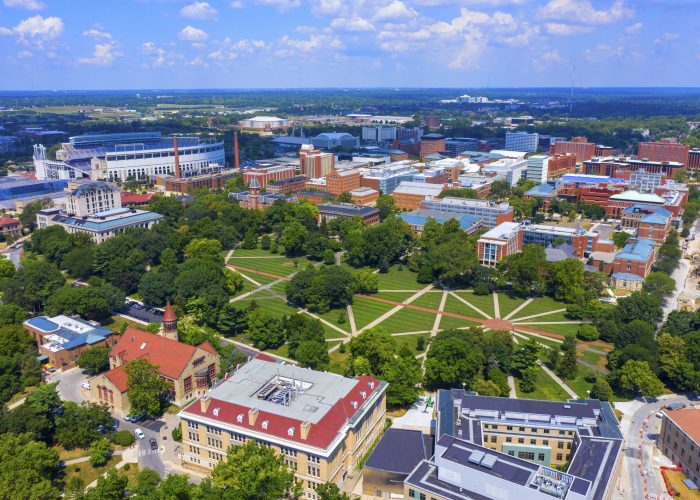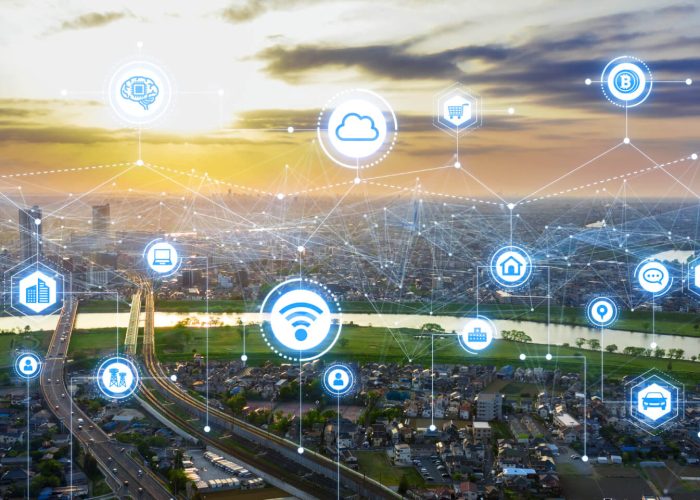Smart campus solutions have become vital tools for colleges and universities to address today’s ever-evolving educational environment. These technologies may seem out of reach for those with tight budgets and many issues to address, but many smart campus solutions can provide savings to fund some or all of their costs.
These solutions improve operations and the quality of life for campus residents while also increasing energy efficiency. Schools can utilize a performance contract to finance a project and pay it back with the energy and efficiency savings generated from that same project.
Let’s look at six key trends shaping higher education’s future.
Smart Campus, Defined
A smart campus is a college or university that leverages available technology and data-driven solutions to enhance efficiency, sustainability, and safety. Like smart cities, the primary goal of a smart campus is to create a more connected, responsive, and intelligent learning environment.
Organizations use a litany of technologies to create a smart campus. Some common components include smart building controls for lighting, temperature, and security, mobile apps for campus information and schedules, and even digital signage for an interactive interface for information on news, events, and directions.
Smart Campus Trends
The Smart campus is a rapidly growing need in higher education as more colleges look for ways to improve their infrastructure, services, and budgets using technology. Some of the latest trends in smart campuses include:
1. IoT – Internet of Things
At the heart of any smart campus is IoT (Internet of Things). By connecting previously siloed systems and infrastructure, organizations can harness new insights into their operations. IoT-enabled infrastructure allows schools to see the forest around the trees so that different aspects of their campus (energy usage, environmental conditions, occupancy, security, etc.) can be monitored and managed more effectively.
2. Smart Transportation
Integrating real-time traffic monitoring, connected vehicle systems, and charging stations helps reduce traffic congestion, increase traffic flow, and promote more sustainable commuting options for students, faculty, and staff. Smart Transportation enhances mobility and contributes to a safer, more efficient, and more sustainable campus.
3. Connected Lighting & Connected Buildings
Integrating building systems allows for better overall control and energy efficiency. These systems often include lighting, temperature controls, security, and maintenance. Collecting and analyzing data from these systems allows an institution to optimize energy usage, reduce operational costs, and improve safety and security measures. For most campuses, these systems deliver the largest environmental impacts while also creating a more comfortable and responsive campus.
4. Campus Wi-Fi
Wi-Fi networks support the digital world that students, faculty, and staff are utilizing. Reliable high-speed Wi-Fi in classrooms, libraries, or even outdoor spaces provides seamless access to educational resources, online tools, and campus services. A quality internet connection directly impacts educational outcomes by empowering students to learn, faculty to teach, and administrators to manage the campus efficiently. A strong and accessible Wi-Fi infrastructure not only fosters connectivity but also contributes to the overall productivity and satisfaction of the campus community.
5. Renewable Energy
Institutions are reducing their carbon footprint and energy costs by implementing renewable energy technologies like solar and geothermal systems. These initiatives not only align with environmental goals but also serve as valuable educational tools, helping students learn about sustainable practices firsthand. These technologies also provide a level of resiliency and redundancy to a campus’ energy supply, helping to minimize the impacts of power outages.
6. Student/Faculty Engagement
Through interactive learning platforms, virtual classrooms, and online collaboration tools, institutions are fostering dynamic and immersive educational experiences. These technologies enable students to actively participate in their learning process, access resources anytime, and connect with peers and instructors across distances. Moreover, mobile apps and digital platforms provide convenience via easy access to campus information, schedules, and support services. By embracing student engagement with technology, colleges and universities are adapting to evolving educational trends and creating more vibrant and inclusive campus communities that cater to the digital-native generation.
Smart Campus Adoption
Smart campus technologies are being implemented at colleges and universities of all sizes, though the specific systems and integrations used depend on many complex variables, including existing infrastructure challenges. Before embarking on a smart campus project, leaders should consider several factors to ensure its success and alignment with their institution’s visions and goals. Some critical considerations include funding, data privacy, security, scalability, and future-proofing.
Ready to Design a Smarter Campus?
Are you interested in exploring smart infrastructure? Our team is here to help! We can evaluate your unique opportunities and develop a roadmap for implementing critical improvements today to better prepare your students for tomorrow.
Hear From Satisfied Clients.








